
In India, a woman is raped every sixteen minutes but the conviction rate is only 26 %. According to the National Crime Record Bureau’s annual report of 2021, an average of 86 cases were reported per day and a total of 31,677 cases were lodged in India. After the brutal gang rape and murder case in 2012, known as the Nirbhaya case, the government introduced several changes to the criminal justice system including tougher sentences, the death penalty if the victim’s age is less than 12 and many more. However, despite these measures, rape cases continue rise, making it one of the most alarming issues related to women’s safety.
Several research reports suggest that in most of the rape cases two out of three sexual assaults are committed by a known person of the victim and 38% are friends or have a family connection.
According to the U.S. Department Justice Report
Around 31,000 rape cases were reported in India in 2022 even after 10 years of Nirbhaya case. After the Nirbhaya case several changes were made for stronger punishment. But still the numbers have been persistently increasing.
In this context Criminal Lawyer Rebecca M.Jhon, who has presented several rape cases stated that most of the criminals think that would get away with their crime. And the most common reason for this is due to less fear from the Indian Legal System due to low application of appropriate punishments to the criminals.
According to NCRB data, the conviction rate of rapes is approximately between 27 % to 28% from 2018- 2022.
Rape survivors in India often face several harassment and humiliation at hospitals, police stations and even in normal public places. Police sometimes do not cooperate or lodge an FIR on the basis of the victims’ statements and make the procedure lengthy which subsequently causes tampering of the proofs. Police sometimes are not even unwilling to provide protection to the victims, victim’s family and witnesses.
Dalit victims, victims from low socio-economic groups, victims from rural areas have often shared their experience of facing discrimination on both caste and gender. And these discriminations sometimes negatively affect the result for justice.
Police often create pressure to the victims, victims’ families and caseworkers for outside court settlement. They use several tactics to push victims for settlement like by threatening the victim’s family or giving them advice for compromise through marriage with the accused or force them to dilute the written complaints.
Many survivors and caseworkers stated that they were not aware of the Indian law system. They are not aware about the facilities that our legal system has given. For example, many victims and caseworkers don’t know that an action can be taken against the police if they are not filing an FIR against sexual assault, under 166 A(c) IPC.
In the Indian legal system, a Cognizable Offence or Cognizable Case is a serious crime in which Police are bound to register FIR and arrest the accused without a warrant. According to section 154 of the Cr.P.C. for any cognizable case police must receive an FIR even without a magistrate’s permission and to start the investigation immediately.
Zero FIR was introduced after the 2012 Nirbhaya gang rape case based on the recommendation of the Justice Verma Committee. This FIR is mainly applicable for cognizable cases and can be registered at any police station, irrespective of jurisdiction. It aims to support victims against serious crimes especially women and children by ensuring that investigations begin as soon as possible.
On the basis of Section 357C of Cr.P.C., private and government hospitals can’t charge any amount for the treatment of rape victims. All hospitals are bound to provide treatment free of cost immediately. If any hospital charges any amount from rape victims, the hospital authority will be punished under section 166B of the Indian Penal Code and shall be liable for a fine.
Two-finger test can’t be performed during treatment of the rape victims. According to the Supreme Court of India, this test is illegal because it violates the privacy and rights of rape victims, affects their mental health and undermines their dignity. The only duty of medical service providers is to identify injuries and wounds in the private parts of rape victims to verify whether the rape has been committed against victims or not. Doctors do not have the rights to check the past activity and history of victims before the incident.
When a male doctor is allocated for the procedures, the doctor has to take the consent from the rape victim and also have to inform them about what kind of tests will be performed during examination. And if a doctor commits the two-finger test, then action will be taken as rape under section 375 of the Indian Penal Code because of inserting an object in a private part.
A Trial with protection and dignity is mandatory in rape cases. According to Section 26, Cr.P.C. trials should be preceded in front of woman and must be in comfortable environment. Any question that assassinates the character of the rape victim is not allowed. Section 53A states that any question related to the previous sexual history is not allowed.
Victim Compensation scheme is another facility that should be known by women especially rape victims. According to this scheme (Section 357A) a minimum of 4 lakh to a maximum of 7 lakh rupees shall be provided to the victims as compensation depending on some factors. The factors are:
Rape is a serious crime. Victims sometimes suffer throughout their whole life. Many victims don’t get proper justice due to our faulty legal system. As a citizen of India, we have the responsibility to support and help the rape survivors and give them strength to fight against the crime. We should also motivate them to not step back from their rights.
We have to make India a safe place for women.